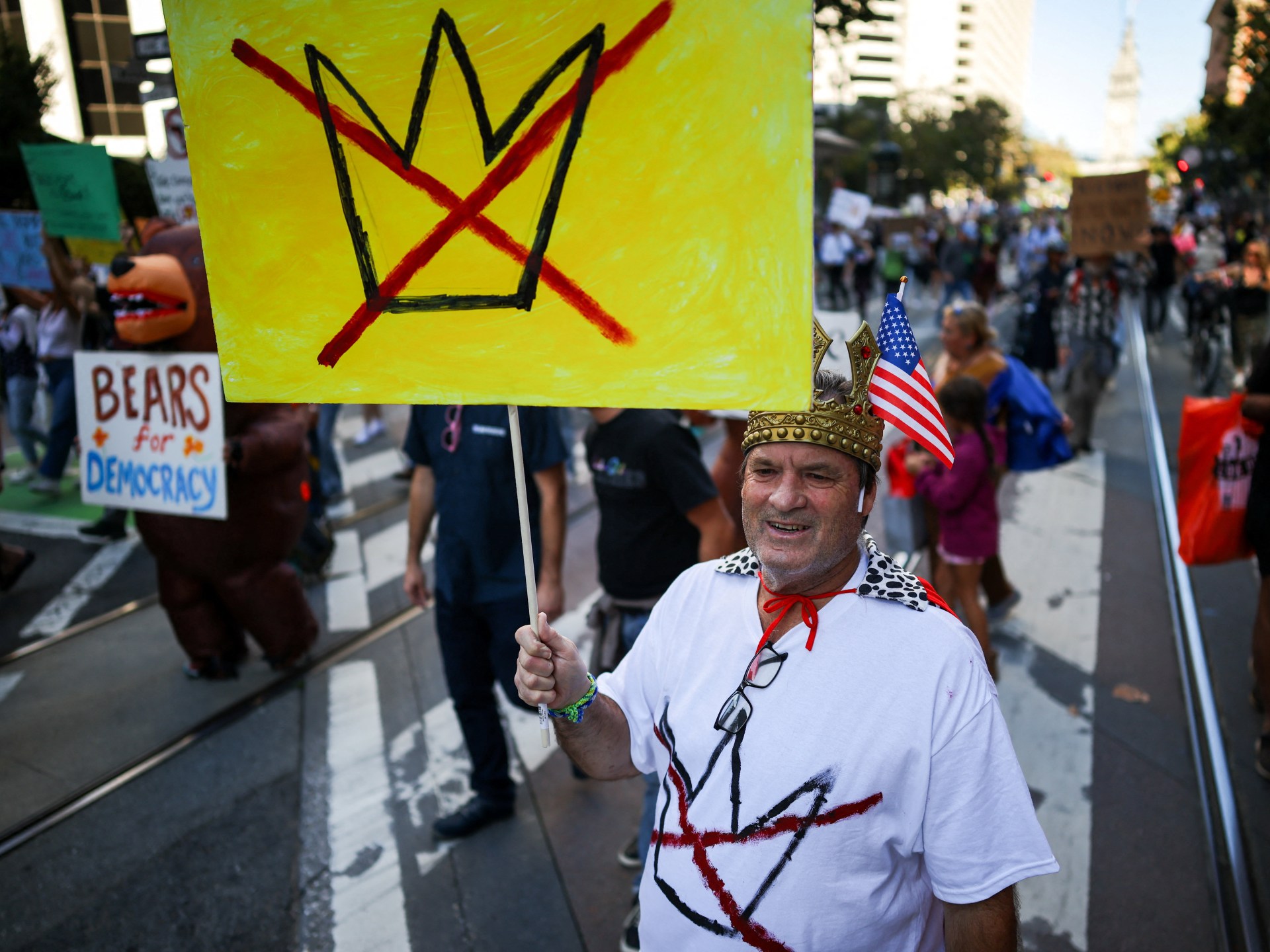Published On 19/10/2025
|
Last update: 23:30 (Mecca time)
Washington- After a day of widespread demonstrations that spread across various American states under the slogan “No Kings,” discussions continue in Washington about the implications of the popular movement and its political impact on the administration of President Donald Trump.
The protests came in a context characterized by declining confidence in federal institutions and the continued government closure, which made them widely read as a sign of growing tension between the executive authority and public opinion.
According to the organizers, the number of participants approached 7 million demonstrators, who went out in about 2,700 protest sites across the country, to send a clear message against what they describe as “the encroachment of the executive authority and the threat to democratic controls.”
On the other hand, Republican officials launched an attack on the movement, describing it as “anti-American,” while President Trump mocked the protesters by publishing a video generated with artificial intelligence techniques, depicting him wearing a crown and flying a fighter plane bearing the phrase “King Trump.”
While observers believe that the movement revealed a crisis of legitimacy in the relationship between power and society, some Republicans acknowledge that the division within their party has reached a critical stage, while others consider that the real test of the weight of these movements will be in the upcoming elections, not in the streets.
Legitimacy crisis
Professor David Soper, professor of constitutional law at Georgetown University, believes that the “No Kings” demonstrations express a real legitimacy crisis facing the administration of President Donald Trump in its relationship with broad sectors of Americans.
Suber told Al Jazeera Net, “The use of secret police methods, political prosecutions, and excessive violence makes many people feel that the administration is behaving in a way that is not consistent with a free society,” explaining that “even former supporters of the president have begun to express internal doubts, but the White House is continuing with the hard power approach and will not respond to the protests because they do not threaten its position in power.”
Soper added that the White House’s handling of the demonstrations “reflects a style of governance that sees the opposition as a threat to the regime itself, not just a difference of opinion.”
He points out that the administration, along with the majority of Republicans, “will continue to ignore or attack the protests, as White House spokeswoman Carolyn Levitt did when she described opponents as Hamas supporters, irregular immigrants, and criminals, which are statements that offend more than they justify.”

Election challenge
For his part, former Republican Representative Thomas Garrett believes that citizens have the right to express their opinions through peaceful demonstration, but he does not consider these protests to represent an actual challenge to the current administration.
Speaking to Al Jazeera Net, he said, “It is wonderful that people stand up and express their opinions in a peaceful and organized manner. This is what distinguishes the American system and shows its strength, and it is something that other countries may look at with admiration,” adding that the protest itself “is not a delegitimization of the government, but rather part of normal democratic practice.”
Garrett continues, “The real test for any administration will be at the ballot boxes. The upcoming elections will show whether these votes will translate into actual political change.”
He said, “Any administration, whatever its policies, will face those who criticize it or believe that it is not performing its work as it should, but what is important is that it listens carefully to the demands raised, because democracy means that everyone is heard.”
Regarding President Trump’s handling of the protests and his ridicule of them with the video generated by artificial intelligence, Garrett believes that this is “a method of sarcastic political discourse, and is a reciprocal response to those who are accustomed to using sarcasm against Republicans.”
Republican split
Observers believe that the electoral base of the Republican Party is now experiencing a growing division between younger generations dissatisfied with the concentration of power and wealth, and leaders adhering to the hard power rhetoric expressed by President Trump.
According to a survey conducted by the Associated Press and Public Opinion Research Center at the University of Chicago last September, 61% of Republicans under the age of 45 believe that the country is “going in the wrong direction,” compared to 43% of the older group.
These numbers indicate a discrepancy within the Republican base itself regarding the assessment of the general situation in the country, which – according to analysts – reflects the escalation of suspicion within the ruling party, among an age group that is supposed to be the most loyal to the conservative project.
In this context, Ashley Ansara, a member of the Republican Party in Florida, believes that the current crisis “goes beyond partisan disagreement to a deeper conflict between the economic elite that owns the largest share of the country’s wealth and the rest of Americans.”
Ansara added in an interview with Al Jazeera Net, “This shift in the popular mood highlights the widening gap between the wealthy elite and the rest of Americans, and may open the door to transformations within the Republican Party itself in the coming years, unless its priorities are redefined in response to the demands of the people and not the interests of capital.”

